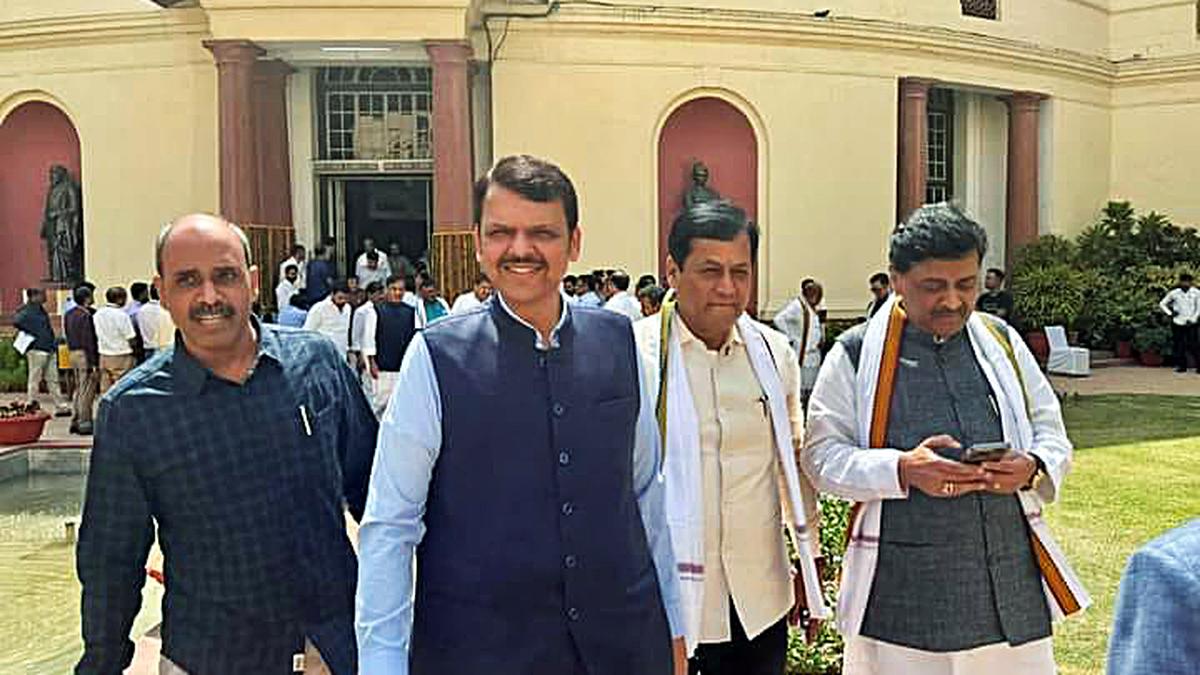In a significant political development, Union Home Minister Amit Shah has advised senior BJP leader Devendra Fadnavis to continue his role as the Deputy Chief Minister of Maharashtra. This directive came days after Fadnavis offered to resign following the BJP’s disappointing performance in the state during the recent Lok Sabha elections.
The Meeting and Its Implications
Fadnavis met with Amit Shah at the latter’s residence on Thursday, reaffirming his decision to step down. However, Shah suggested that Fadnavis should maintain his position until further discussions could be held post the oath-taking ceremony of Prime Minister Narendra Modi over the weekend. This move highlights the strategic considerations within the BJP, emphasizing continuity and stability in leadership during challenging times.
Electoral Performance and Repercussions
The BJP-led National Democratic Alliance (NDA), known as the Mahayuti in Maharashtra, faced significant electoral setbacks in the state. The BJP managed to secure only nine Lok Sabha seats, a steep decline from the 22 seats it won in the 2019 elections. Meanwhile, the Shinde-led Shiv Sena emerged with seven seats, and Ajit Pawar’s faction of the NCP secured just one seat. In stark contrast, during the 2019 elections, the Shiv Sena-BJP coalition had clinched 41 out of the total 48 seats in the state.

Fadnavis, taking responsibility for the poor performance, had offered to resign two days prior. However, Chief Minister Eknath Shinde expressed that the electoral defeat was a collective responsibility of the alliance. “I will speak to Devendra ji soon,” Shinde remarked, indicating his intent to discuss the matter further with his deputy.
Shinde’s Perspective and Forward Strategy
Chief Minister Shinde emphasized the need for a thorough review of the reasons behind the Mahayuti’s defeat. He mentioned that Fadnavis is keen on focusing on rebuilding the party in preparation for the upcoming assembly elections later this year. “We have worked together in the past and will continue to do so in the future. Failures must not discourage us,” Shinde stated, showcasing a united front despite the electoral challenges.
Shinde, who had previously ousted Uddhav Thackeray from the Shiv Sena with the support of most MLAs and MPs in 2022, also acknowledged the performance of Thackeray’s faction. The Uddhav-led faction managed to win nine seats in the general elections, reflecting their significant presence in the state’s political landscape. Shinde pointed out that the Mahayuti received more than two lakh votes in Mumbai, suggesting that there were some positive aspects to the coalition’s efforts despite the overall loss.

Challenges Faced During the Campaign
One of the critical issues highlighted by Shinde was the failure of the ruling coalition to counter the opposition’s narrative during the election campaign. “The false narrative that the Constitution will be changed hurt us,” he said, indicating that misleading claims by the opposition played a significant role in the electoral outcome. This highlights the importance of effective communication and counter-strategies in political campaigns.
Fadnavis’s Commitment to the Party
Days after accepting responsibility for the BJP’s poor performance, Fadnavis reiterated his decision to resign, citing his desire to focus on party work ahead of the assembly elections. According to a report by NDTV, during a discussion at the NDA meeting on Friday, Fadnavis, alongside fellow Deputy CM Ajit Pawar and CM Eknath Shinde, delved into the reasons behind the NDA’s performance in Maharashtra.
“I take responsibility for the result in Maharashtra. I am requesting the party leadership to relieve me from the responsibility in the government so that I can work full-time for the party in the upcoming assembly elections,” Fadnavis stated. His commitment to addressing the shortcomings and preparing for future elections underscores his dedication to the BJP’s organizational strength in the state.

Upcoming Assembly Elections
The assembly elections in Maharashtra, scheduled to take place in less than six months, add urgency to the BJP’s internal deliberations and strategic planning. Fadnavis’s acknowledgment of his role in the recent electoral performance and his pledge to overcome the shortcomings reflect a focused approach towards the forthcoming political battle.
“The entire responsibility for this result is mine. I agree that I was lacking somewhere in all this and am going to make all efforts to overcome this shortcoming,” Fadnavis admitted, demonstrating accountability and a resolve to improve.
The Mahayuti alliance in Maharashtra, consisting of the BJP, Eknath Shinde’s Shiv Sena, and Ajit Pawar’s NCP, secured 17 Lok Sabha seats. In contrast, the opposition alliance, Maha Vikas Aghadi (MVA), comprising the Congress, Uddhav Thackeray’s Shiv Sena, and Sharad Pawar’s NCP, won 30 seats out of the total 48. Specifically, the Congress won 13 seats, the Shiv Sena (UBT) nine seats, and the NCP (SCP) eight seats.
This comparison reveals a significant shift in the state’s political dynamics, highlighting the challenges faced by the Mahayuti alliance and the strategic gains made by the opposition.
ALSO READ: Media Tycoon Ramoji Rao, Chief of ETV Network, Passes Away at 87
The political landscape in Maharashtra is poised for intense activity and strategic maneuvering in the lead-up to the assembly elections. Amit Shah’s advice for Fadnavis to continue as Deputy Chief Minister underscores the importance of experienced leadership during turbulent times. As the BJP and its allies gear up for the next electoral challenge, their focus will likely be on addressing the shortcomings identified in the recent Lok Sabha elections and strengthening their organizational framework to regain political ground in the state.












